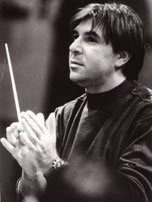PROMS 2002
PROM 72: Tchaikovsky, Mussorgsky, Mahler, Olga Borodina (mezzo-sop), Royal Philharmonic Orchestra, Daniele Gatti, RAH, 13th September 2002 (AR)
Tchaikovsky, Fantasy-Overture 'Romeo and Juliet'
Musorgsky, orch. Shostakovich, Songs and Dances of Death
Mahler, Symphony No. 5

Daniele Gatti’s programme of works was unified by the themes of love and death. Gatti produced the necessary passion, intensity and drama to pull the evening off, as did the RPO, who matched their conductor’s drama and emotion: I have seldom heard the RPO in such excellent form.
Gatti paced Romeo & Juliet with a granite, Klemperer-like grandeur, prioritising the structural over the sensational. The work opened with a wonderfully phrased and played dark cello sound which set the mood of the work. The climactic moments were very well judged and never inflated, whilst the familiar love theme string playing was swooningly beautiful but never sentimental. The RPO played with bravado, passion, and sensitivity.
Orchestra and conductor changed gear and mood with Mussorgsky’s Songs and Dances of Death (orch. Shostakovich) with mezzo-soprano Olga Borodina. The orchestra seemed to take on Borodina’s deep dark velvety tones. Although Borodina is a mezzo-soprano she also has a light, lyrical and flexible quality with a wide dynamic and dramatic range producing a wonderful variety of moods and emotions. The Shostakovich orchestration was sparse and chamber-like, evocative of a barren wasteland. The orchestration of the fourth song is strikingly similar to Mahler’s Das Knaben Wunderhorn with its martial inflections and the orchestra displayed great sensitivity and repose in accompanying this extremely versatile and passionate singer.
Gatti’s manic account of Mahler’s 5th was one of the fastest I’ve ever heard, yet, oddly, it never felt rushed - merely urgent and electrically charged. Indeed, this performance was strikingly reminiscent of Hermann Scherchen’s vital, 1964 Philadelphia Orchestra performance. Mahler’s symphonies are essentially conductors’ music‚ choreographed for podium acrobatics, and Gatti conducted with every sinew of his body.
The first movement, marked Funeral March, was taken at a measured pace‚ but was just as Mahler surely intended it to be with Gatti perfectly judging the pace but never allowing the music to drag. The opening solo trumpet was superbly played with a dark and austere sound. The second movement was taken at a faster tempo than usual, but this in no way diminished the brooding drama and the orchestra handled this high-speed delivery with great aplomb. The ‘cellos and basses opened the movement with a dark, dissonant passage which the rasping brass section sliced through with nerve-wracking attack. The reflective and distant episode almost melted into nothingness with the quietest ‘cello playing; Gatti gave the impression of almost losing the plot and pace of the music until the insistent brass came back in and dragged us back to reality.
The intense RPO strings were in their element in the third movement, producing a gliding, sliding lilt, and Gatti understood this lilting element, making the music dance. After the well paced central trio section and crisply played pizzicato passage, Gatti suddenly slowed down to almost a halt, coming perilously close to losing the line and the tension.
The Adagietto, at around 9 minutes, lacked that essential distilled melancholia that this movement requires. However, what was so refreshing about Gatti’s pacing was that although he sacrificed none of the poignancy of the piece it stripped away that dragged, soul-on-sleeve smaltz, and avoided the sentimentality that bedevils this movement under conductors like Bernstein and Tennstedt. Klemperer called this close to salon music‚ and hearing Gatti’s reading, one can hear why.
The last movement was paced like a roller coaster ride, off the rails. Gatti and orchestra performed with white-hot energy, bringing the symphony to a wondrous, explosive conclusion. There may be some who will find Gatti’s Mahler 5th crude, superficial and too hurried. Yet Gatti somehow succeeded in giving the work a kind of manic energy close to fever pitch. He took risks, he chanced his arm, and the result was a completely idiosyncratic version of a familiar work he made us listen to afresh.
It was the Royal Philharmonic Orchestra’s evening, however: they were on top form, producing a weighty, dark and grainy sound so essential for Mahler.Alex Russell
 Return to:
Return to: